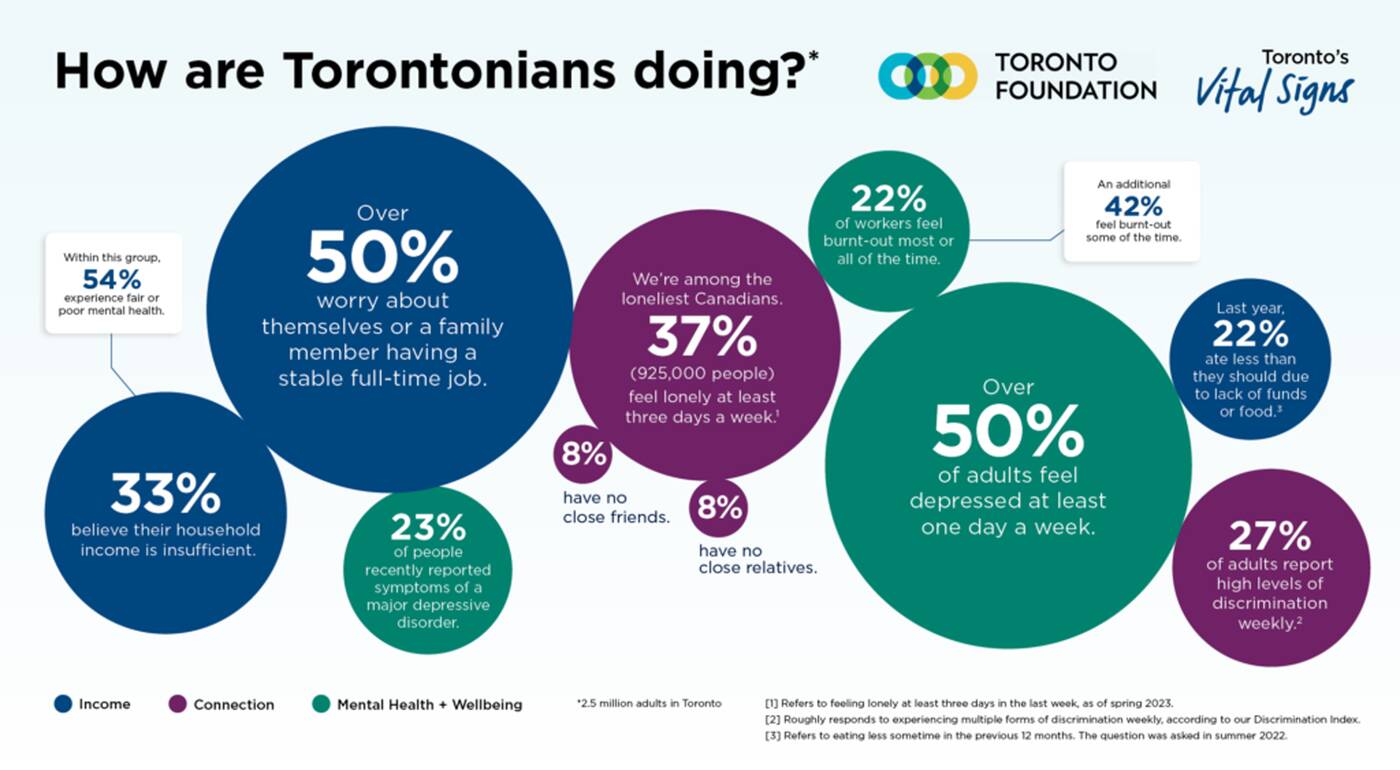
Worrying report shows Toronto is a 'lonely' city 'overwhelmed' by unaffordability
A new report shining a spotlight on the state of Toronto paints a troubling picture of a city in decline, its residents battling a "shocking" spike in depression, isolation and the growing affordability crisis plaguing the region.
The Toronto Foundation's 19th biennial Toronto's Vital Signs Report finds that residents of Canada's economic and cultural capital are feeling increasingly lonely and disconnected, and that mental health in the city has only grown worse since the previous report in 2021.
The report finds that a shocking 37 per cent of Toronto residents polled — which would translate to a staggering 925,000 people if that poll covered everyone in the city — admitted to feeling lonely at least three or four days of the last week.
Loneliness particularly affects the younger population, with reports of loneliness among high school students doubling since the last report to 44 per cent frequently feeling lonely.
Toronto's mental health crisis has visibly spilled out into streets, the TTC and other public places as almost 1 in 4 adult residents grapple with symptoms of a major depressive disorder. Almost 20 per cent of adults report symptoms of moderate anxiety.
Friend groups are shrinking, as the percentage of Toronto residents with six or more close friends declined by almost 30 per cent in the nine years from 2013 to 2022.
Loneliness, depression, and other mental health challenges are further exacerbated by the unaffordability crisis driven by runaway inflation, Bank of Canada lending rates and general cost of living increases since the previous report two years earlier.
According to the report, one out of every three Toronto residents believes that their household income is insufficient, a significant increase from one in five reported back in 2018.
Less income means smaller living spaces, with the study finding 17 per cent of people in Toronto's census metropolitan area living in what they describe as "overcrowded conditions." That number almost doubles to 32 per cent — roughly one-third — of newcomers to Canada residing in the city.
All of these issues compound one another, like how residents have less disposable income and free time to work with, which has brought donations and volunteering to charitable organizations down to a trickle.
The city's volunteer and donation rates both plummeted by 12 per cent between 2018 and 2022, losing 300k donors and 300k volunteers.
Even positive findings, like how over half of Toronto nonprofits reported revenue growth in 2023, are overshadowed by counterpoints like the 90 per cent of nonprofits that experienced an increase in expenses this year.
Almost one-third of charities tapped into reserves just to stay afloat this year, while three-quarters of nonprofits noted an increase in service demands — 62 per cent are struggling to keep up with that increase and 16 per cent can't meet demand at all.

The Toronto Foundation's latest Toronto's Vital Signs Report shows a city in decline.
The findings make it crystal clear that Toronto is struggling, and the Toronto Foundation is embarking on a 150-day campaign that it hopes will "revive faith in the city's future."
"Raising the alarm bells is not enough," says Toronto Foundation president and CEO Sharon Avery.
"Sitting back and waiting for something to change is just not an option. It's time to change Toronto's trajectory. We've got to make people believe in the city again."
"Your city needs you," Avery pleads of Toronto residents. "We want Torontonians to believe there are people who care about them, their businesses and their neighbourhoods."
"We want people to believe there are things to look forward to. Let's use these findings as a catalyst to re-engage with the city we all love and together shape the future we want."
To do its part in jumpstarting the city's dwindling vitality, the Toronto Foundation has partnered with Volunteer Toronto to provide up to $1,000 microgrants for civically-minded initiatives.
Latest Videos
Latest Videos
Join the conversation Load comments







